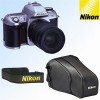Nikon F80QD User Manual - Page 29
continued
 |
UPC - 718122227020
View all Nikon F80QD manuals
Add to My Manuals
Save this manual to your list of manuals |
Page 29 highlights
Shooting in Each Exposure Mode-continued • ¢: Manual Enables you to set both shutter speed and aperture manually. With electronic analog exposure display in the viewfinder, you can produce various creative effects by adjusting the exposure. Long Time Exposure (Bulb) can be set in Manual exposure mode. 1 Rotate the exposure mode select dial to select ¢. NOTE: Minimum aperture with CPU Nikkor lens (except G-type) Always set the aperture ring of a CPU Nikkor lens (except G-type) to its minimum (largest f-number). When the lens is not set to its minimum aperture setting, ƒEE blinks in the LCD panel and viewfinder and the shutter locks. • When a non-CPU Nikkor lens is attached, ƒ-- appears in the LCD panel and viewfinder. Set/confirm aperture with the lens aperture ring. Camera's exposure meter cannot be used. See "Lens Compatibility" on page 34 for details. 2 Set the shutter speed and aperture and confirm by looking at the electronic analog exposure display in the viewfinder. • Set the shutter speed by rotating the Main-Command Dial and the aperture by rotating the Sub-Command Dial. These functions can be set independently. • Long Time exposure (Bulb) can be set by setting the shutter speed to buLb (page 65). • When the shutter speed is set to 1/125 sec., the shutter can be released with the camera back open. • When the exposure compensation is set, only the electronic analog display changes-selected shutter speed and aperture do not change. c 12: Shutter speed can be set to change with the Sub-Command Dial and aperture with the Main-Command Dial (page 74). Electronic analog exposure display The electronic analog display in the viewfinder indicates the difference between the selected exposure (shutter speed and aperture) and the correct exposure. Not available with Long Time Exposure. The electronic analog exposure display blinks when the subject brightness is beyond the camera's exposure range. The following examples show electronic analog exposure display indications: Correct exposure -1/2 EV Over +3 EV Exposure 3 Compose picture, focus and shoot. 56 57















